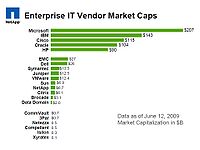Tip: Ctrl +/- to increase/decrease text size
At last week’s 2009 analyst meeting, Dan Warmenhoven, NetApp’s CEO, addressed industry pundits at the company’s Sunnyvale headquarters. As he did last year, Warmenhoven indicated the firm is doubling down on its bet that pure play storage companies will continue to dominate the field. This was an interesting topic to us here at Wikibon as we’ve recently written about EMC’s prospects in this regard.
NetApp is a $3.4B company with 8,000 employees and a good balance sheet. But it’s a ‘tweener’ in the IT sector. Not huge like HP and IBM, but much larger than smaller pure plays like 3PAR and Compellent. In his keynote, Warmenhoven raised the question that he said he’s frequently asked: “Who is going to buy NetApp?” His answer is essentially no one, because no company wants to own or can afford to own NetApp.
Warmenhoven put up the following chart in defense of his thesis:
The graphic shows the market values of leading IT players and certain potential acquisition candidates. Here’s what Warmenhoven said about some of the companies on this list of likely NetApp pursuers.
- -EMC would face anti-trust issues.
- -Dell – NetApp is too rich for Dell to absorb.
- -HP is happy with its existing offerings.
- -IBM is already selling NetApp and making good money, why buy the company?
- -Cisco really needs VMware, not NetApp.
As such, says NetApp’s CEO, the company will remain independent and be a buyer, not a seller.
On balance, Wikibon agrees, perhaps for somewhat different reasons. With a market cap of between $6-7B, NetApp in our view is too expensive or not a good fit for prospective buyers. Here’s our take on why companies aren’t likely to shell out the $8B that would be required to acquire NetApp:
- EMC – Too much overlap. Spending $8B to fill a storage virtualization hole makes no sense.
- Dell – Oil and water
- HP – Unlike Warmenhoven, we don’t see what HP has to be so happy about with its current offerings. It resells Hitachi at the high end and the EVA and MSA platforms are un-remarkable. HP’s virtualization strategy is fragmented, it’s software is a marketecture band-aid made to look like a complete solution, and its sales force consistently loses to EMC and NetApp outside the HP base. Having said that…it appears HP is happy with this position and is more likely to invest in software and services.
- IBM invests big money in software and services, as that’s where the company’s margin and differentiation model thrive. XIV and Diligent are about as much as Palmisano would allow IBM storage to spend.
- Cisco – There’s no overlap with NetApp, and Cisco is building out its stack. But Cisco’s objectives are to create a data center stack that can efficiently communicate with resources across the network and become the dominant player in the data center of the future. Why does Cisco need to pay $8B to own proprietary storage technology in its stack? It doesn’t.
So we're left agreeing with Warmenhoven, NetApp will remain independent for a while. NetApp has had a huge run with WAFL (Write Anywhere File Layout). It has enabled a single-architecture, industry-leading storage virtualization, the industry's most flexible architecture for a widely installed platform, ease of support for multiple protocols, a single set of software and a #1 spot in the market for space efficient storage.
The question we have is how much further can NetApp go? Are we witnessing a trend similar to the minicomputer days, where the likes of Prime Computer, Wang Labs and Data General, while highfliers in their day, were big but not attractive enough growth prospects to be acquired (notwithstanding DG’s smart move to re-invent the company as a storage player and subsequently sell to EMC).
How NetApp behaves in the near term depends on whether it wins the battle to acquire Data Domain. If it succeeds, it will be intensely distracted for 18 months with a weakened balance sheet. If it loses to EMC, we expect NetApp to go shopping for a solution to help it compete in the backup market. Maybe acquiring backup software in the portfolio would be a good start.
Action Item: Users should expect NetApp to remain independent for the forseeable future. NetApp will likely continue to acquire technologies to incrementally improve efficiency but the company is not expected to radically change its fundamental shape in the near-to-mid-term.
Footnotes:







